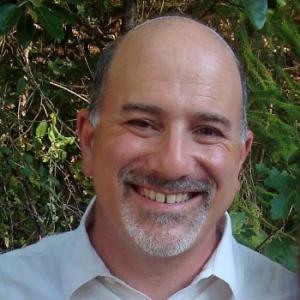 Joseph, then viceroy of Egypt, decides to hold Benjamin to pressure his brothers to bring their father Jacob to Egypt. His true identity is still hidden from his brothers. But Judah steps forward to intervene (Gen. 44:1-14). As Vayigash opens, in an impassioned plea, Judah offers himself in place of Benjamin (Gen. 44:18-34). Where does Judah, who once lacked strength to protect Joseph, finally find the courage? In this midrashic monologue, we imagine Judah recounting the moments just before his audience with the Egyptian leader:
Joseph, then viceroy of Egypt, decides to hold Benjamin to pressure his brothers to bring their father Jacob to Egypt. His true identity is still hidden from his brothers. But Judah steps forward to intervene (Gen. 44:1-14). As Vayigash opens, in an impassioned plea, Judah offers himself in place of Benjamin (Gen. 44:18-34). Where does Judah, who once lacked strength to protect Joseph, finally find the courage? In this midrashic monologue, we imagine Judah recounting the moments just before his audience with the Egyptian leader:
“Years ago, at that pit with my brothers, I acquiesced to their rage. When they wanted to kill Joseph, I faced a terrifying choice: Stand up to them as my brother’s protector or sit back, protect myself, and let the fates decide. Back then, I stood silently by, even when it became clear that our brother’s life was in danger. Only when the option to sell him into slavery presented itself did I choose the lesser of two evils (Gen. 37:25-28). But then I became part of the devastation of our father Jacob. We lied to him, saying that Joseph had died, and we broke his heart. Oh, how our father mourned! Oh, how quickly he aged! (Gen. 37:31-35).
“Then, before my audience with this Egyptian leader, I realized: Here I was again. Caught between impossible choices, should I speak out to protect my brother Benjamin from Pharaoh’s viceroy? Or should I remain quiet, protecting the majority of us, yet subjecting young Benjamin to an unknown fate? Standing up might have endangered my whole family. Returning to Canaan without Benjamin would surely have killed my father.
“My aunts Bilhah and Zilpah taught me that my grandmother, Rebekah, believed that the Holy One’s Voice guides us (Gen. 25:22-23). But I had never heard that Voice before. And then this happened….”
(Re)discovering The Voice Within
Under such pressure,
I was lost and alone.
I wanted to go home.
So many lives in my hand,
Where and when should I take a stand?
I needed the Voice to guide me.
Unable alone to discern
How to decide this growing concern,
With nowhere else to turn,
With my insides starting to churn,
My disbelief I decided to spurn,
And I cried out:
“Where are You now? I need you!
Where are You?”
Just before I stood before the throne,
When I felt the most alone,
When my anxiety had run its course,
And my crying voice was utterly hoarse,
When I had no tears left to shed,
I sensed it right there in my head,
In the midst of my anguish and fear,
A still, small voice right then I did hear,
Responding with words that declare...
“I am here.”
“I am here,”
Said the Voice,
“And here I always have been,
Right inside you.”
It was the Kol d'mama daka
(That still small Voice inside),
Whispering my father Jacob’s own words
From his encounter by the sulam,
That ladder to heaven,
Achen yesh Adonai bamakom hazeh,
"Behold, [I, Adonai] am in this place" (Gen. 28:10),
And in this moment too.
"I am here,
If you let me in” (Menachem Mendel of Kotzk)
So I wiped away my tears,
Held in check my debilitating fears,
Filled my lungs with breath that seared,
And, like a young child to his father
Who seemed so far, far away,
I asked:
“Where were You?
When my brothers were in a murderous rage.
When my actions with Tamar almost destroyed my life and hers.
When the famine came, threatening starvation.
Where were You?"
And then the Voice enveloped me,
Like a tallit wrapped around my heaving shoulders.
It held me close,
And let me cry.
Ever so compassionately,
It let out a sigh,
Answering:
“Remember back when,
In the midst of your brothers’ bloodthirst,
You found the words to engage,
To temper their rage,
Convincing them to spare Joseph’s head
When he was assuredly all but dead?
And after the bloodlust dissipated,
And before the guilt abated,
Did you ever wonder whereupon
You found the ability to carry on?
“And remember when,
In the depths of your shame,
After you had called out Tamar, your daughter-in-law—accused adulteress—by name,
And then she brought forth your signet, cords, and staff,
Proving her truthfulness and your culpability? (Gen. 38:1-30)
You could have denied, denied, denied.
But instead you finally replied
That those things were yours.
And you accepted responsibility to ensure
That Tamar and your children
Were cared for forevermore.
Did you ever wonder where you found that courage?"
"It’s all in there," the Voice said. “I’m in there. In you."
“Literally.
“Your name Yehudah consists of five letters—
Yud-Hei-Vav-Dalet-Hei.
Take away the Dalet
And the Four that remain
Spell out the Tetragrammaton, My Holy Name.
This means,
Yud-Hei-Vav-Hei
Is within you. (the S’fat Emet)
“So if you find yourself in a troubling situation
in which you must stand up to someone’s damnation,
or hold back on your weak-kneed fixations,
or forgo that licentious assignation,
You may think,
Bi adoni,
which means, “please, my lord”
or
Bi Adonai,
which means, “Within me is Adonai.”
Same letters, same intent.
An eternal truth does it represent,
I’ll be whispering quietly, and I won’t relent.
I’ll be pointing a way forward.
Kakatuv b’Torahteinu (as it is written in our Torah): And so Judah approached [Pharaoh’s viceroy, Joseph] and said, Bi adoni (please my lord), give your servant a hearing…” (Gen. 44:18). So now please, let [me] remain as [your] slave in place of [Benjamin], and let the lad go home with his brothers (Gen. 44:33),… And then Joseph cleared the room and said to his brothers, “I am Joseph…" (Gen. 45:1-3). “Come draw near to me… and don’t be troubled” (Gen. 45:4-5).
And from then on Judah knew,
As we all might now know too,
That in our moments of greatest fear,
Or when the choices are too much to bear,
We might strive to be aware,
That the Voice is within us, it’s clear.
That, like in Yehudah,
The Voice
Is always
In us…
Right in there.
Rabbi Paul Kipnes, MAJE, a popular lecturer on raising spiritually balanced, emotionally whole children, is leader of Congregation Or Ami in Calabasas, CA. A former camp director and North American Federation of Temple Youth (NFTY) regional advisor, Rabbi Kipnes and his wife Michelle November, MSSW, co-wrote Jewish Spiritual Parenting: Wisdom, Activities, Rituals, and Prayers for Raising Children with Spiritual Balance and Emotional Wholeness (Jewish Lights Publishing).
 “You’re Zachary, right?” Grandma asked. “What do you do?”
“You’re Zachary, right?” Grandma asked. “What do you do?”
“I’m a rabbi,” I answered.
“What do rabbis do?”
I thought for a moment: “We teach, Grandma!”
(30 seconds later)
“I forget,” Grandma continued, “What do you do?”
“I’m a rabbi.”
“What do rabbis do?”
I reconsidered my first response: “We help people through life moments, Grandma.”
(30 seconds later)
“Tell me,” Grandma continued, “What do you do?”
I’m a rabbi.”
“What do rabbis do?”
I struggled to help her better understand: “We visit people who are in need.”
This was how the conversations were with Grandma in the sunset years of her life. Her mind was failing, but she still yearned for connections. Grandma would ask the same questions over and over. And each time, I answered in a different way, as though Grandma would hear it a different way and eventually understand. But it dawned on me… Grandma never needed to hear it differently.
I needed to hear it differently.
Her piercing question, “What do you do?” caused me to think, to really think, “Zach…. What do rabbis do?” And even more so, her question motivated me to receive the question God asked Adam in the Garden of Eden, Ayeka, “Where are you?” (Gen. 3:9)” Where am I in life? What am I doing? Is my soul-print on earth making a difference? Am I running around in search of meaning?
Adam couldn’t respond easily to God. He was afraid and hid. It took almost the entire Book of Genesis for humanity to better learn God’s question.
The Creation of the world is juxtaposed with story after story in Genesis of how humans mess things up by not having real connections. Cain murdered his brother, Abel. Isaac only saw his estranged brother Ishmael at their father’s funeral. There were no words. A generation later, Jacob and his older brother, Esau, embraced. But Jacob did no t’shuvah, no repentence for the stolen birthright or attempt at reconciliation.
But here, in Vayigash, Joseph is the first one to reconnect with full disclosure. He doesn’t hide. He doesn’t avoid. He doesn’t run. Joseph steps forward and says to his family, “I am Joseph…" (Gen. 45:1-3). “Come draw near to me… and don’t be troubled” (Gen. 45:4-5).”
So often we avoid difficult situations by ignoring them. We turn away rather than draw close. We hide rather than talk. But Joseph … he shows us that running leads to trouble. But embracing reveals God’s voice within.
And me… There I was, living as a rabbi, trying to find meaning in so many places. But God’s voice was there all along, shining through from my incredible grandma. “Hineini” I realized. “Here I am.” And with that, I drew close to Grandma and hugged her. Her trouble, for a moment, went away. And my journey reached a new milestone. I was no longer defining a rabbi. I was living a moment.
After all, sometimes, all you need is a hug.
Rabbi Zachary Shapiro is the spiritual leader at Temple Akiba in Culver City, CA. Rabbi Shapiro's misson is to bring goodness into the world. His weekly blog, "A Moment in Time," reminds us that every day provides opportunities to harness goodness. A musician and composer, Rabbi Shapiro has written liturgical folk music used around the country. His children's book, "We're All in the Same Boat," (Putman, 2009), is adored by children worldwide. A native of Boston, Zach received his B.A. in Spanish from Colby College in Waterville, ME. His has been married to Ron Galperin, Los Angeles City Controller, since their religious ceremony in 2002, and again in a legal ceremony in 2008. He was appointed to the HUC-HIR Board of Governors in 2018.
Vayigash, Genesis 44:18−47:27
The Torah: A Modern Commentary, pp. 281–297; Revised Edition, pp. 286–301
The Torah: A Women’s Commentary, pp. 259–280
Haftarah, Ezekiel 37:15–28
The Torah: A Modern Commentary, pp. 357−358; Revised Edition, pp. 302−303
Explore Jewish Life and Get Inspired
Subscribe for Emails


